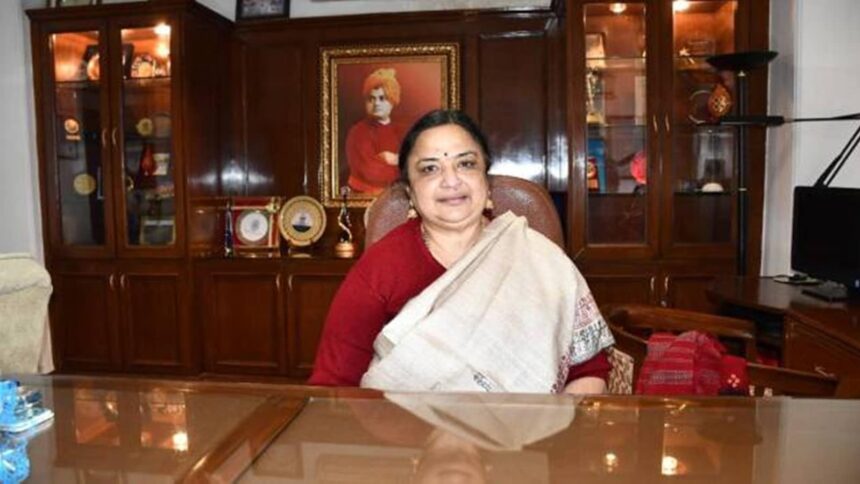The vice-chancellor of Jawaharlal Nehru University (JNU), Dr Santishree Dhulipudi Pandit, on Thursday said that Operation Sindoor asserts that India will not be “blackmailed by nuclear threats” and will punish “not only terrorists but the systems that nourish them”.
Pandit was delivering the valedictory address as she presided over the convocation of the College of Military Engineering (CME) in on Thursday morning.
Thirty-five officers were conferred degrees under the academic affiliation of the JNU. This included 11 officers from the MTech (Structural Engineering) course and 24 officers from the Technical Entry Scheme (TES) course who received BTech degrees in civil and mechanical engineering.
Referring to Operation Sindoor, India’s retaliatory response after the Pahalgam terror attack, Pandit said it “represents the changed doctrine that redefines national goals”.
“India’s national security philosophy is no longer one of ambiguity and endurance. It is now of clarity, consequence and retaliation. The Pahalgam attack – barbarically targeted and state-sponsored – was not the first provocation but a final trigger. In response, India launched Operation Sindoor, a calibrated multi-domain retaliation that changed our national security paradigm,” she said.
“(Operation) Sindoor was not just a military operation but a declaration. It asserted that India will not absorb terrorism as a cost of geography or diplomacy. It will retaliate. It will define the escalation matrix. And it will punish aggression through strength, not speeches. The significance of Operation Sindoor lies in operational brilliance and strategic symbolism,” she added.
Saying that Operation Sindoor was the beginning of a new strategic era, Pandit said, “It asserts that India will not be blackmailed by nuclear threats. India will retaliate across domains – military, cyber, diplomatic, hydrological. India will punish not only terrorists but the systems that nourish them. India will shape the narrative before it is shaped by others. It is the doctrine you are part of and it is the doctrine you must help sustain, through your preparedness, innovation and unapologetic assertion of our national interest. Deterrence is not a slogan. It is infrastructure, data, logistics and precision – the very things you have been trained for.”
The JNU vice-chancellor added, “In the past, India made some strategic errors. Trusting third parties to resolve internal issues…internationalising domestic concerns…and assuming that restraint would earn respect. No longer. Operation Sindoor decisively rejected any third-party mediation…”.
“You are now a part of a doctrine that no longer allows Pakistan to hide behind non-state actors. You are part of a generation that has rejected the fatalism of strategic restraint and has adopted strategic clarity of national interest. Artificial intelligence and machine learning are no longer civilian luxuries but are military necessities. In the cyber warfare phase of Operation Sindoor, we witnessed a dramatic evolution that, for the first time, cyberspace became an active theatre of conflict. It is not science fiction. It is your battlefield,” Pandit said, addressing the gathering.
Addressing the 35 officers, Pandit said, “Graduating today means stepping out in a world more volatile, complex, and interdependent than ever before. A world where technology disrupts borders, cyberattacks undermine sovereignty and engineered narratives shape geopolitical outcomes. It is a world where the old doctrines of diplomacy have collapsed under the weight of asymmetry, hybrid warfare and proxy battles. But it is a world today where India stands tall, emerging not just as a regional anchor but as a global conscience. The world you enter from here is one beyond engineering and military doctrine, but one where technological mastery is a prerequisite tool for you to preserve the sovereign status of India. You are not merely engineers, you are the architects of India’s deterrence.”
CME Commandant Lieutenant General A K Ramesh encouraged the graduating officers to remain committed to professional excellence by staying attuned to ongoing innovations and challenges in the engineering domain. Brigadier Ravi Reddy, Officiating Deputy Commandant and Dean, CME, presented the academic report for Spring Term 2025.
Lieutenant Colonel Neeraj Parmar was awarded the Gold Medal and General Officer Commanding-in-Chief Army Training Command (ARTRAC) Award for securing the top position in the MTech (Structural Engineering) course. The General Officer Commanding-in-Chief ARTRAC Award for BTech (Civil Engineering) and BTech (Mechanical Engineering) went to Lieutenant Priyansh Mishra and Lieutenant Anshuman Chaudhary of TES, respectively.








